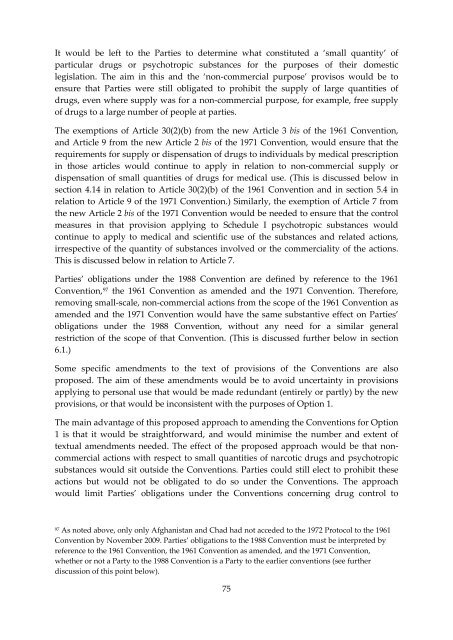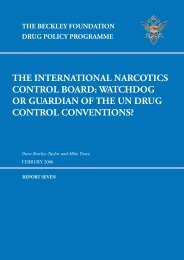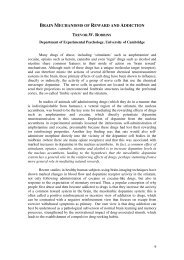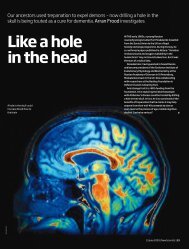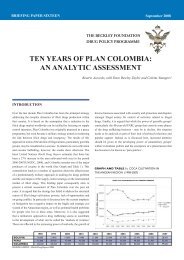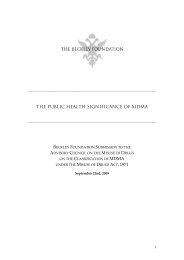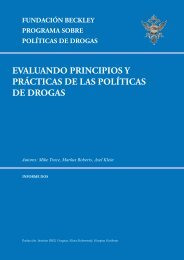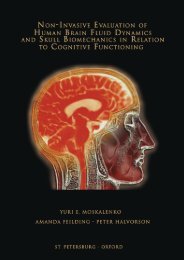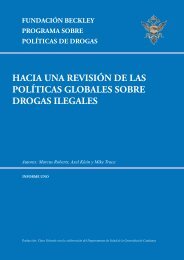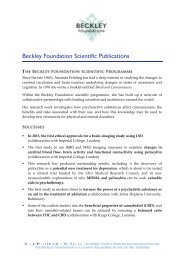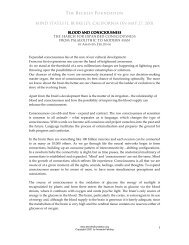roadmaps to reforming the un drug conventions - Beckley Foundation
roadmaps to reforming the un drug conventions - Beckley Foundation
roadmaps to reforming the un drug conventions - Beckley Foundation
Create successful ePaper yourself
Turn your PDF publications into a flip-book with our unique Google optimized e-Paper software.
It would be left <strong>to</strong> <strong>the</strong> Parties <strong>to</strong> determine what constituted a ‘small quantity’ ofparticular <strong>drug</strong>s or psychotropic substances for <strong>the</strong> purposes of <strong>the</strong>ir domesticlegislation. The aim in this and <strong>the</strong> ‘non-commercial purpose’ provisos would be <strong>to</strong>ensure that Parties were still obligated <strong>to</strong> prohibit <strong>the</strong> supply of large quantities of<strong>drug</strong>s, even where supply was for a non-commercial purpose, for example, free supplyof <strong>drug</strong>s <strong>to</strong> a large number of people at parties.The exemptions of Article 30(2)(b) from <strong>the</strong> new Article 3 bis of <strong>the</strong> 1961 Convention,and Article 9 from <strong>the</strong> new Article 2 bis of <strong>the</strong> 1971 Convention, would ensure that <strong>the</strong>requirements for supply or dispensation of <strong>drug</strong>s <strong>to</strong> individuals by medical prescriptionin those articles would continue <strong>to</strong> apply in relation <strong>to</strong> non-commercial supply ordispensation of small quantities of <strong>drug</strong>s for medical use. (This is discussed below insection 4.14 in relation <strong>to</strong> Article 30(2)(b) of <strong>the</strong> 1961 Convention and in section 5.4 inrelation <strong>to</strong> Article 9 of <strong>the</strong> 1971 Convention.) Similarly, <strong>the</strong> exemption of Article 7 from<strong>the</strong> new Article 2 bis of <strong>the</strong> 1971 Convention would be needed <strong>to</strong> ensure that <strong>the</strong> controlmeasures in that provision applying <strong>to</strong> Schedule I psychotropic substances wouldcontinue <strong>to</strong> apply <strong>to</strong> medical and scientific use of <strong>the</strong> substances and related actions,irrespective of <strong>the</strong> quantity of substances involved or <strong>the</strong> commerciality of <strong>the</strong> actions.This is discussed below in relation <strong>to</strong> Article 7.Parties’ obligations <strong>un</strong>der <strong>the</strong> 1988 Convention are defined by reference <strong>to</strong> <strong>the</strong> 1961Convention, 97 <strong>the</strong> 1961 Convention as amended and <strong>the</strong> 1971 Convention. Therefore,removing small-scale, non-commercial actions from <strong>the</strong> scope of <strong>the</strong> 1961 Convention asamended and <strong>the</strong> 1971 Convention would have <strong>the</strong> same substantive effect on Parties’obligations <strong>un</strong>der <strong>the</strong> 1988 Convention, without any need for a similar generalrestriction of <strong>the</strong> scope of that Convention. (This is discussed fur<strong>the</strong>r below in section6.1.)Some specific amendments <strong>to</strong> <strong>the</strong> text of provisions of <strong>the</strong> Conventions are alsoproposed. The aim of <strong>the</strong>se amendments would be <strong>to</strong> avoid <strong>un</strong>certainty in provisionsapplying <strong>to</strong> personal use that would be made red<strong>un</strong>dant (entirely or partly) by <strong>the</strong> newprovisions, or that would be inconsistent with <strong>the</strong> purposes of Option 1.The main advantage of this proposed approach <strong>to</strong> amending <strong>the</strong> Conventions for Option1 is that it would be straightforward, and would minimise <strong>the</strong> number and extent oftextual amendments needed. The effect of <strong>the</strong> proposed approach would be that noncommercialactions with respect <strong>to</strong> small quantities of narcotic <strong>drug</strong>s and psychotropicsubstances would sit outside <strong>the</strong> Conventions. Parties could still elect <strong>to</strong> prohibit <strong>the</strong>seactions but would not be obligated <strong>to</strong> do so <strong>un</strong>der <strong>the</strong> Conventions. The approachwould limit Parties’ obligations <strong>un</strong>der <strong>the</strong> Conventions concerning <strong>drug</strong> control <strong>to</strong>97As noted above, only only Afghanistan and Chad had not acceded <strong>to</strong> <strong>the</strong> 1972 Pro<strong>to</strong>col <strong>to</strong> <strong>the</strong> 1961Convention by November 2009. Parties’ obligations <strong>to</strong> <strong>the</strong> 1988 Convention must be interpreted byreference <strong>to</strong> <strong>the</strong> 1961 Convention, <strong>the</strong> 1961 Convention as amended, and <strong>the</strong> 1971 Convention,whe<strong>the</strong>r or not a Party <strong>to</strong> <strong>the</strong> 1988 Convention is a Party <strong>to</strong> <strong>the</strong> earlier <strong>conventions</strong> (see fur<strong>the</strong>rdiscussion of this point below).75


